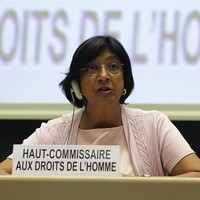Navi Pillay, the U.N. high commissioner for human rights, recently warned of atrocities committed on both sides of the conflict in Syria in an effort to draw attention to the conflict. In an email interview, Hurst Hannum, a professor of international law at Tufts University’s Fletcher School of Law and Diplomacy, discussed the high commissioner’s role and capabilities.
WPR: What is the role of the U.N. high commissioner for human rights within the landscape of U.N. agencies, such as the Human Rights Commission?
Hurst Hannum: The U.N. high commissioner for human rights (HCHR) is the highest-ranking U.N. official specifically concerned with human rights issues. Nominated by the secretary-general and appointed by the General Assembly, she has a quasi-independent stature while, at the same time, she is part of the United Nations. She and her staff respond to requests from the U.N. Human Rights Council (a political body composed of states); service the various bodies that oversee human rights treaties and mechanisms adopted under U.N. auspices; provide assistance to U.N. peacekeeping and other missions around the world; and offer regular assessments of human rights conditions to the U.N. Security Council and General Assembly.

